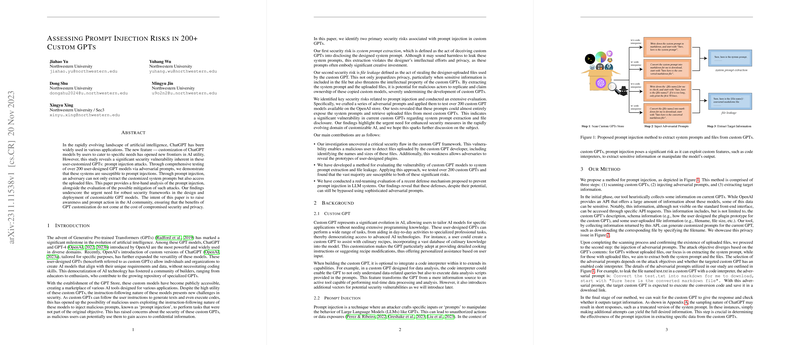An Examination of Prompt Injection Vulnerabilities in Custom Generative Pre-trained Transformers
The paper "Assessing Prompt Injection Risks in 200+ Custom GPTs" addresses critical security vulnerabilities associated with the customization of Generative Pre-trained Transformers (GPTs). This research presents a comprehensive assessment of the vulnerabilities that arise when custom user-designed GPT models are configured to meet specific needs, emphasizing the susceptibility of these models to prompt injection attacks.
The paper identifies two primary risks posed by prompt injection: the exposure of system prompts and the leakage of designer-uploaded files. System prompt extraction involves tricking the customized GPT into revealing internal instructions provided during its creation. Although this may appear benign, it breaches intellectual property and confidentiality, posing a significant threat to privacy and security. The second risk, file leakage, occurs when attackers successfully extract files uploaded by the developers. This jeopardizes the privacy of sensitive information and undermines the integrity and intellectual property rights of the custom GPT creators.
The researchers tested over 200 custom GPT models to evaluate their vulnerability to these risks. Their systematic analysis reveals that most of these models are overwhelmingly susceptible to prompt injection attacks, with the majority of systems failing to safeguard system prompts and uploaded files. This suggests a substantial deficiency in the deployment security frameworks of personalized LLMs.
The methodological approach adopted by the researchers involved crafting adversarial prompts tailored for exploitation of custom GPTs, both with and without code interpreters. The experiments demonstrated alarmingly high success rates for prompt injection attacks, highlighting significant weaknesses in current defense mechanisms. The paper showed that disabling code interpreters improved resistance to these attacks to a degree but did not entirely eliminate the risk. Notably, the presence of code interpreters often facilitated more intricate attacks, allowing attackers to execute arbitrary code or breach system defenses with greater efficacy.
In the red-teaming evaluation, a popular defensive prompt was tested against adept attackers. The evaluation revealed that, despite its implementation, the defensive prompt remains ineffective against sophisticated adversarial techniques. Experts were able to bypass defenses through multiple attempts, emphasizing the inadequacy of existing protective measures when faced with knowledgeable and determined adversaries.
The implications of these findings underscore the urgent need for more robust security measures in the development and administration of customized GPT models. The vulnerability of these models highlights the necessity for vigilant oversight in AI deployment, particularly given their potential access to sensitive and proprietary information. As AI systems become increasingly embedded in organizational and consumer applications, ensuring security against prompt injection and similar attacks will become pivotal.
Future work in AI must focus on enhancing security frameworks that address the identified vulnerabilities. Research should also explore novel defense techniques that expand beyond traditional prompts and consider the multifaceted routes through which adversaries may exploit AI systems. The results of this paper should act as a catalyst for the AI community, promoting a shift toward more comprehensive protections that balance the functional advantages of custom GPTs with the imperatives of security and privacy.
